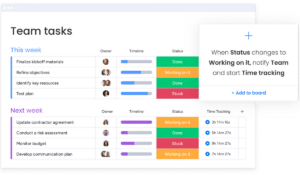The importance of digital marketing in today’s business landscape
In the ever-evolving digital world, businesses must adapt and innovate to stay competitive. One crucial element of success in this landscape is the ability to effectively leverage digital marketing. As consumers increasingly turn to the internet for information, products, and services, a strong online presence has become a necessity. Digital marketing enables businesses to reach and engage with their target audience, build brand awareness, and drive sales.
The evolution of marketing tools and software
Over the years, marketing tools and software have evolved to keep pace with the changing needs of businesses and marketers. From traditional methods such as print and broadcast advertising, marketing has transitioned to digital channels like search engines, social media, and email. As the complexity of digital marketing has grown, so has the need for advanced tools and software. This is to be able to manage and optimize campaigns.
Introducing the concept of digital marketing software
Digital marketing software is a comprehensive suite of tools designed to simplify and streamline online marketing efforts. These tools help businesses manage and optimize their digital marketing campaigns, track performance, and generate actionable insights. With digital marketing software, businesses can automate processes, personalize content, and make data-driven decisions. In this blog post, we will delve into the world of digital marketing software and explore its key components, some of the most popular software solutions, and best practices.
Key Components of Digital Marketing Software
Marketing automation
Marketing automation is a crucial component of digital marketing software that enables businesses to automate repetitive tasks and processes. This includes tasks such as lead generation, nurturing, and scoring, as well as customer segmentation and targeting. By automating these tasks, businesses can save time and resources while maintaining a consistent marketing strategy. Marketing automation also helps in personalizing content and messaging. This in turn ensures that the right message reaches the right audience at the right time.
Social media management
In today’s digital landscape, social media plays a significant role in shaping brand perception and driving customer engagement. Social media management tools within digital marketing software help businesses manage their presence across various platforms. For example, Facebook, Twitter, Instagram, and LinkedIn. These tools allow marketers to schedule posts, monitor engagement, track brand mentions, and analyze performance. This ensures a unified and consistent brand voice across channels and helps in building strong relationships with customers.
Email marketing
Email remains one of the most effective channels for reaching and engaging with customers. Digital marketing software often includes robust email marketing tools that help businesses create, send, and track personalized email campaigns. From designing visually appealing templates to automating email sequences and segmenting audiences, email marketing tools enable businesses to optimize their email marketing efforts and drive higher engagement and conversions.
Content management and optimization
Content is at the heart of any successful digital marketing strategy. Management and optimization tools within digital marketing software help businesses create, manage, and distribute compelling content across various channels. These tools often include features such as content planning, creation, editing, and scheduling, as well as SEO optimization and keyword research. By streamlining the content creation process, businesses can ensure that their content is relevant, engaging, and optimized for search engines.
Analytics and reporting
Data-driven decision-making is essential for successful digital marketing. Analytics and reporting tools within digital marketing software provide businesses with valuable insights into their marketing performance. These tools help marketers track key metrics such as website traffic, conversion rates, and engagement levels. Additionally, they enable marketers to generate customizable reports for easy analysis. By leveraging these insights, businesses can make informed decisions about their marketing strategies, identify areas for improvement, and measure the success of their efforts.
Popular Digital Marketing Software Solutions
Overview of top digital marketing software providers
There are numerous digital marketing software providers in the market, each offering unique features and capabilities to cater to different business needs. Some popular providers include HubSpot, Marketo, Salesforce, Adobe Experience Cloud, monday.com and Hootsuite. These platforms offer a wide range of functionalities, from marketing automation to social media management, content marketing, and analytics.
Key features and functionality to look for
When evaluating digital marketing software solutions, it’s essential to consider the features and functionality that best align with your business goals and requirements. Some key features to look for include:
- Marketing automation capabilities for streamlining repetitive tasks
- Social media management tools for managing and monitoring multiple platforms
- Email marketing tools for creating, sending, and tracking campaigns
- Content management and optimization features for streamlining content creation and SEO
- Analytics and reporting tools for data-driven decision-making
In addition to these core features, consider the platform’s usability, integrations with other tools, and the level of customization it offers.
Pricing and budget considerations
Digital marketing software solutions come in various pricing models, ranging from freemium plans to subscription-based pricing and even custom pricing based on business size and requirements. When evaluating software options, consider your budget and the return on investment (ROI) that the platform can provide. Be sure to factor in any additional costs, such as onboarding, training, and add-ons, that may impact your overall investment.
Reviews and recommendations
To gain a better understanding of how well a digital marketing software solution performs and whether it’s suitable for your business, seek out reviews and recommendations from industry experts and other users. Online review platforms, case studies, and testimonials can provide valuable insights into a platform’s strengths and weaknesses, as well as its overall performance and customer satisfaction. Additionally, you can reach out to your professional network for personal recommendations and experiences with various software solutions.

Best Practices for Implementing and Maximizing Digital Marketing Software
Setting up a strong foundation with proper onboarding and training
To ensure a successful implementation of digital marketing software, it’s essential to establish a strong foundation from the start. This includes proper onboarding and training for your team members who will be using the software. Make sure to allocate sufficient time and resources for learning the platform’s features and functionalities, as well as any best practices or tips for maximizing its potential. Most software providers offer training resources, such as tutorials, webinars, and documentation, to help users get started.
Continuously monitoring and refining your marketing strategy
Implementing digital marketing software is not a one-time effort. To achieve the best results, you should continuously monitor and refine your marketing strategy based on the data and insights provided by the platform. Regularly review your campaigns’ performance, identify areas for improvement, and make adjustments as needed. This iterative approach will help you stay agile and responsive to changing market conditions, ensuring your marketing efforts remain effective and aligned with your business goals.
Staying up-to-date with industry trends and software updates
The digital marketing landscape is constantly evolving. Hence, it’s crucial to stay informed about the latest trends, tools, and best practices. Regularly engage with industry news, blogs, and forums to keep abreast of any new developments that could impact your marketing strategy. Additionally, stay up-to-date with any updates or new features released by your digital marketing software provider, as these can help you further optimize your campaigns and stay ahead of the competition.
Leveraging integrations and add-ons for increased functionality
Most digital marketing software solutions offer integrations with other tools and platforms to enhance their functionality and streamline your marketing processes. Take advantage of these integrations to create a more cohesive marketing ecosystem and reduce the need for manual data entry and management. Integrations can also help you unlock new features and capabilities, such as advanced analytics, CRM integration, or e-commerce functionality, further enhancing your marketing efforts.
Encouraging a culture of innovation and experimentation
One of the key benefits of digital marketing software is the ability to test and experiment with different strategies, tactics, and content. Foster a culture of innovation within your team. This will encourage them to try new ideas, explore different marketing channels, and continuously optimize their efforts. By embracing a data-driven, experimental approach, you can drive continuous improvement and unlock new opportunities for growth and success.
Conclusion
The role of digital marketing software in shaping the future of marketing
Digital marketing software has emerged as an essential tool for businesses looking to thrive in the competitive online landscape. By streamlining processes, automating tasks, and providing valuable insights, these tools empower businesses to create effective marketing campaigns, engage with their target audience, and drive tangible results. As the digital marketing landscape continues to evolve, the role of digital marketing software in shaping the future of marketing will only grow in importance.
The potential for business growth and success with the right tools in place
Investing in the right digital marketing software can unlock new opportunities for growth and success for your business. By leveraging the power of these tools, you can optimize your marketing efforts, make data-driven decisions, and ultimately, achieve better results. With the right software in place, you can stay agile and responsive to changing market conditions. This ensures your marketing strategy remains effective and aligned with your business goals.
Discover the Benefits of monday.com with Omnitas Consulting
As a proud partner of monday.com, we recommend this versatile and powerful digital marketing software platform to help you achieve your marketing goals. monday.com offers a comprehensive suite of tools, including marketing automation, social media management, email marketing, content management, and robust analytics, making it the ideal solution for businesses looking to streamline their digital marketing efforts.
By choosing monday.com and working with us at Omnitas Consulting, you can unlock new opportunities for growth and success for your business. We will provide expert guidance on implementing and optimizing the platform, ensuring that you can leverage its full potential to drive results. Stay agile and responsive to changing market conditions, while keeping your marketing strategy aligned with your business goals.
Ready to embrace the future of marketing with monday.com and Omnitas Consulting? Don’t miss this opportunity to revolutionize your digital marketing efforts. Contact us today to get started with monday.com and unlock the full potential of your online marketing strategy.
























